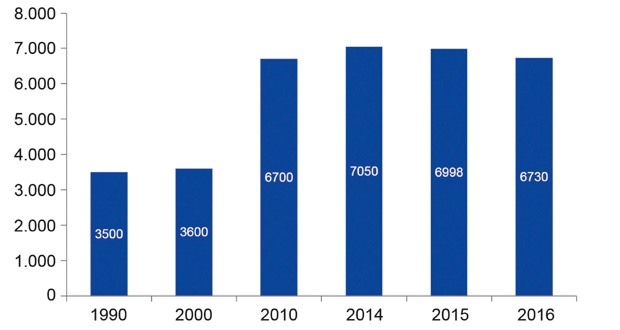Coal mining fell worldwide by 3.8 % to 6.7 bn t in 2016. This was due to the trend in China (- 185 mt) and the USA (- 147 mt). The shale gas boom was not the only factor to play a part in this in the USA. The USA is a provider with relatively high costs on the world market, which has put the industry under pressure. In China, the central government has started to close uncertain, expensive mines. However, China’s imports rose to 124 mt, in particular to balance out production cutbacks as a result of working-time restrictions.
Without these two effects, global coal mining would have risen by 64 mt rather than falling by 268 mt. Coal mining increased in Colombia (5.8 %), Russia (2.9 %), Australia (2.9 %), India (2.1 %) and Indonesia (1.2 %). The rise in production in these countries shows that there are still nations with a growing demand for coal. While India mines a substantial amount itself, but also imports large quantities from the global coal market, there are a good number of ASEAN states that are triggering demand on the world coal market in order to supply newly built coal-fired power plants.
For that reason, seaborne trade in power station coal only dropped by 0.7 %. By contrast, seaborne trade in coking coal fell by 5.2 %. As a result, world seaborne trade dropped by 1.8 % from 1,135 mt to 1,115 mt. The decline slowed down compared with the previous year (-8.5 %).
The downward trend in coal prices came to an end, too. Compared to its lowest levels, the price for steam coal doubled at times, and that of coking coal even tripled. This caused coal to temporarily move to a different competitive position compared with natural gas in terms of energy production. Prices have fallen again in the meantime. Both temporary price fluctuations were overreactions attributable to the production reductions in China.
Imported coal is still a competitive, secure and reliable energy source. As renewable energies cannot guarantee a reliable energy supply on their own, thermal power plant output will continue to be an essential contributor for a fairly long time. Coal is an ideal partner for this – it is protected against crisis because its source countries are spread across the world. And natural gas does not produce zero emissions either. If the German energy transition is to remain a success, it must also be implemented in other sectors. CO2 emissions in road traffic and heating applications rose in 2016. The greatest increase in CO2 emissions was from the use of natural gas, at 9.5 %. (VDKi/Si.)


